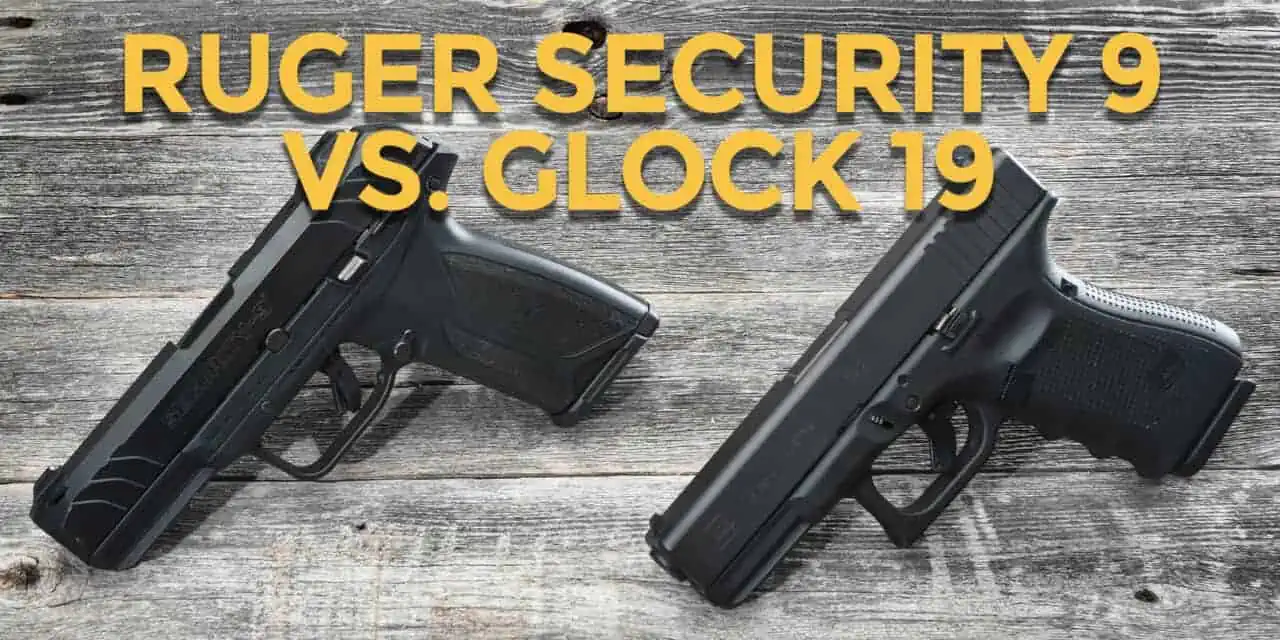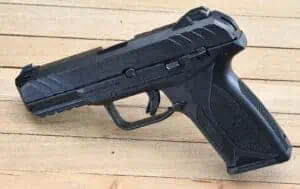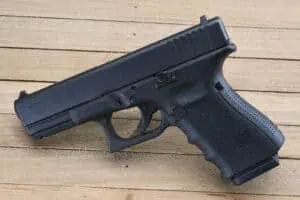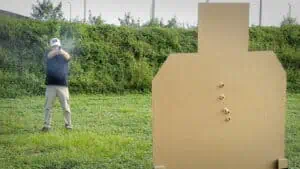Head To Head: Ruger Security 9 vs Glock 19.
A compact 9mm pistol might just be the perfect defensive firearm. They are small enough to be carried everyday, yet large enough to be controllable under recoil. Compact 9mm pistols are what I recommend for first-time gun buyers, and there are certainly enough models to choose from. It seems every gun manufacturer out there has some sort of easy to carry polymer-framed 9mm pistol that holds 15 rounds or so.
We’re going to be comparing two different models of compact 9mm pistols, the Ruger Security 9 vs the Glock 19. At first glance, they are very similar. Both hold the same amount of rounds. They are about the same size, shape and weight and have similar sights. As we’ll see, though, there are significant differences between the two. Let’s look at the Glock 19 first, and then the Ruger Security 9.
Ruger Security 9 vs Glock 19: The Glock
Glock introduced their first gun, the full-size Model 17, in the early 80’s. The Model 19 was introduced soon after as a smaller, easier to carry version of the Model 17. Since then, the Glock 19 has become one of the most popular guns ever made. It’s been around for years and is relentlessly reliable. There are so many different accessories available for this gun, I’m pretty certain you could find a holster for it on the surface of the moon if you tried hard enough. The Glock 19 is a striker-fired with a polymer frame with a “ball and bucket” front right / rear sight combination. The model we’ll be testing is the Generation 4 model, which has a short length of accessory rail on the bottom of the frame. Glock, being Glock, uses a different rail system.
The 9mm Gen 4 Glock 19 we tested is functionally identical to the current Gen 5 edition. There model we tested had a trigger that broke at around 5.7 pounds. The trigger feel was consistent with other Glocks, with a short takeup to get the slack out of the trigger, then a definitive, if rather spongy, break. Glock introduced removable backstraps with the Gen 4 guns. The gun we tested had a stippled grip and finger grooves. It also came with different backstraps that can be added to the back of the grip to adjust the grip to various hand sizes. MSRP for the Glock 19 is $549, and it ships with three 15 round magazines.
Ruger Security 9 vs Glock 19: The Ruger
Ruger rolled out their LCP pistol in 2007. The LCP is pocked-sized, hammer-fired .380 ACP defensive pistol. The LCP quickly became one of Ruger’s most popular guns, and in 2017, Ruger upsized the action of the LCP and created the 9mm Security 9. The Security 9 is a full-sized, hammer-fired pistol with an external safety mounted on the side of the frame. The sights on the pistol are very similar to the sights on the Glock, and there is a short length of Picatinny rail on the bottom of the frame of the gun.
On average, the Security 9 had a trigger pull of 4.3 pounds when measured with a digital trigger pull gauge. The trigger had some takeup, and then broke with no overtravel after the shot was fired. The Security 9 frame is stippled for a better grip. Unlike the Glock, however, the grip size does not use different backstraps to adjust to the user’s hand size. The pistol has an MSRP of $379, and ships with two 15 round magazines.
Ruger Security 9Length: 7.24 inches |
Glock 19Length: 7.28 inches |
At first glance, aside from the MSRP, there isn’t a lot of difference with a Ruger Security 9 vs a Glock 19. They’re about the same size and weight and hold the same amount of ammo. There are, however, subtle differences with how they are used at the range.
Taking A Peek Under The Hood
The Security 9 is a hammer-fired gun with an external safety that needs to be disengaged before firing. There is also a blade safety in the trigger of the Security 9 that disengages as the trigger is pulled. The Glock 19 has a blade trigger safety as well, but it has no external safety. An external safety adds one more step to getting your gun into action, and it’s quite common for a new shooter to forget to disengage an external safety as they get ready to fire.
An external safety does have its uses, however. For instance, I prefer an external safety on any gun I’m carrying in a bag or another method of off-body carry. A gun inside a bag is not under my direct control, and I like having that extra layer of security when I carry a gun that way.
How They Differ
There are substantial differences internally with a Ruger Security vs a Glock 19. The Glock is a striker fired gun. This means that rather than a hammer, there is a spring-loaded pin that strikes the cartridge and fires the gun. The striker is pre-tensioned and needs to be released before the gun is disassembled for cleaning. The most common way to do this is to drop the magazine, unload the gun, verify that the gun is unloaded and then pull the trigger to release the striker spring and disassemble the gun. If any of those steps are skipped or done in the wrong order, bad things (very bad things) can happen.
The Ruger Security 9 uses a hammer to strike the firing pin and discharge the gun. The good news is, the Security 9 does not require pulling the trigger before you disassemble the gun. The bad news is, unlike a Glock 19, the Security 9 requires a thin, flat tool such as a screwdriver or the edge of a shell casing in order to be disassembled.
Testing the Ruger Security 9 vs Glock 19
To compare how these two guns do on the range, we’ll be shooting four, five shot groups with each gun, using three different kinds of 9mm ammunition. We’ll also record the speed of each bullet as it leaves the muzzle using a ProChrono PAL chronograph.
Glock 19 Gen 4 |
||
| Blazer Brass 115 gr FMJ Avg. Velocity 1099 fps Avg. Group 2.93 inches |
Federal 147 gr FMJ Avg. Velocity 945 fps Avg. Group 3.32 inches |
Winchester 147 gr JHP Avg. Velocity 908 fps Avg. Group 2.35 inches |
Ruger Security 9 |
||
| Blazer Brass 115 gr FMJ Avg. Velocity 1130 fps Avg. Group 4.21 inches |
Federal 147 gr FMJ Avg. Velocity 899 fps Avg. Group 2.81 inches |
Winchester 147 gr FMJ Avg. Velocity 968 fps Avg. Group 3.31 inches |
Glocks have a reputation for accuracy, and judging by our tests, it’s easy to see why. The Glock turned an overall average group size of 2.87 inches versus the average group size of 3.45 inches for the Security 9. Both guns were reliable in our tests, and shot all the rounds without any hiccups or issues.
So which is best?
The Ruger Security 9 and the Glock 19 are almost identical on the outside. While they won’t fit in the same holster, they are almost the same width, height, weight and length. They both hold 15+1 rounds of ammo in their standard capacity magazine. Their sights are almost the same. The Ruger has an external safety, the Glock does not. The Glock requires pulling the trigger for disassembly, the Ruger does not. The Glock is more accurate, but the Ruger has a better trigger pull. The Ruger costs substantially less money than the Glock, but doesn’t have the Glock’s extensive range of aftermarket accessories.
In the end, the question of Ruger Security 9 vs Glock 19 comes down to how you see yourself using your gun. The adage “buy once, cry once” is 100% true. A Glock 19 costs more, but it will do more for you (much more) over the long term. The lower cost of a Ruger Security 9 allows you to buy more ammo, training and other gear. However, the smaller selection of gear and lower accuracy means you’ll reach the limitations of your gun faster with the Ruger than with the Glock. We’re in a golden age of guns right now, so no matter which gun you choose, it will serve you well for years to come.








